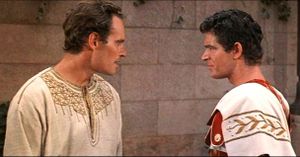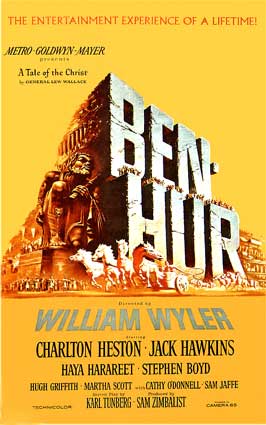Ben-Hur


Ben-Hur is a 1959 film directed by William Wyler and is, the most recent, and most popular film version of Lew Wallace's novel, Ben-Hur: A Tale of the Christ (1880). It stars Charlton Heston as Judah Ben-Hur and Stephen Boyd as Messala. It premiered at Loews Theater in New York City on November 18, 1959. It went on to win eleven Academy Awards, including best picture for 1959, a feat equaled only by Titanic (1997) and The Lord of the Rings: Return of the King (2003).
Judah Ben-Hur lives as a rich Jewish prince and merchant in Jerusalem at the beginning of the 1st century. Preceding the arrival of a new governor, Judah Ben-Hur's old friend Messala arrives as military Tribune (commanding officer of the Roman legions). At first they are happy to meet after a long time, but their different political views separate them - Messala believes in Rome and worldly power, Judah is devoted to his faith and Jewish nationalism. During the welcome parade, a roofing tile falls down from Judah's house and nearly kills the governor (who is thrown from his startled horse). Although Messala knows that they are not guilty he sends Judah to the galleys and throws his mother and sister into prison. But Judah swears to come back and take revenge. En route to the sea, Judah is denied water when his slave gang arrives at Nazareth. He collapses, having lost the will to live, when an as-yet unknown Jesus Christ gives him water and a motivation to survive.
After three years as a galley slave[1], the ship to which Judah has been consigned becomes the flagship of Quintus Arrius, sent by the Emperor to destroy a fleet of Macedonian pirates. Judah's resolve manages to attract the interest of his new commander, though he declines the offer to transfer to Arrius' gladiatorial team, declaring that God will aid him. The Roman armada is attacked by the pirates and Judah's galley is sunk, but Judah manages to save the life of Arrius, who subsequently adopts Judah as his son. Thus given his freedom, and having learned Roman ways (including becoming an expert charioteer), he eventually returns to Judea. There he borrows horses from the Arab sheik Ilderin and defeats Messala in a chariot race before the governor of Judea, Pontius Pilate. Messala, who attempts to cheat his way to victory, is mortally wounded in the race, but tells Judah where he can find his mother and sister: in the valley of the lepers, as they had contracted leprosy while they were in prison.
The film is subtitled "A Tale of the Christ". While the film mostly centers on Judah and his relationship with Mesalla, Jesus appears in the film several times at key points, including the aforementioned incident when he gives water to Judah at Nazareth. Judah attempts to return the favor during Jesus' march to Calvary but is shoved away by the guards. Judah witnesses the crucifixion. Judah's mother and sister are healed by a miracle... as is Judah's heart and soul. He tells his family that as he heard Jesus talk of forgiveness while on the cross, "I felt His voice take the sword out of my hand." The film begins with the Magi visiting the infant Jesus, and ends with the empty crosses in the background and a shepherd and his flock (a strong Judeo-Christian symbol) in the foreground. Out of respect, Jesus is never seen from the front during the entire film. Jesus was played by an old friend of William Wyler's, Claude Heater. He was left uncredited, and hadn't acted in a movie before (and never did afterwards).
1. ^ This is an anachronism. In reality, galley slaves did not exist until the 16th century.

0 Comments:
Post a Comment
<< Home